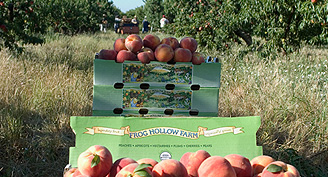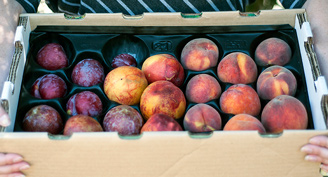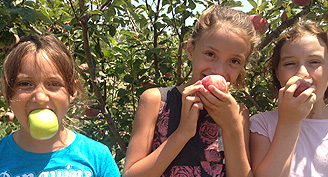THIS WEEK’S FRUIT
Navel Oranges Olsen Organic Farm, Lindsay, CA California Navel Oranges are considered to be the best Navels for eating out of hand. They have a thick skin that is easy to peel, are seedless, and have a meaty and sweet flesh that makes them a perfect snack. Navels are also great for juicing and cooking. Store out of sunlight for 2-4 days on the counter or up to two weeks in the fridge. Clementine Mandarins Olsen Organic Farm, Lindsay, CA Clementines are very sweet, juicy, easy to peel, and usually seedless, making them very popular with children and adults alike. Store out of sunlight for 2-4 days on the counter or up to two weeks in the fridge. Ruby Grapefruit Sundance Natural, Oceanside, CA The Grapefruit is said to cross between the Jamaican sweet orange and the Indonesian pomelo, first documented in 1750. Red grapefruit was an accidental discovery of a red fruit growing on a pink grapefruit tree. Prized for their beautiful color and sweet flesh, Rubys are a favorite. Store out of sunlight for 2-4 days on the counter or up to two weeks in the fridge. Hayward Kiwi Originally known as the Chinese gooseberry due to its Chinese origins. Hawyward Wright, a New Zealand nurseryman propagated his plants by grafting and they eventually became the preferred cultivar of growers due to their sweet flavor and thin skin. Ready to eat when they yield to gentle pressure. Store these on the counter for 4-5 days. Refrigerate for up to two weeks. Pink Lady Apples Cayuma Orchards, New Cayuma, CA A cross between the Golden Delicious and Lady Williams, the Pink Lady is a crisp and juicy apple with a tart finish. Pink skins and a creamy white colored flesh that resists browning makes, this an excellent apple for salads and slicing. Store on your counter out of direct light for 4-5 days. Refrigerate after to maintain crispness.A NOTE FROM FARMER AL
War Zone
Dear CSA Members, These gophers are driving me crazy. I’m driving my golf cart through the pear orchard bouncing along over hundreds of gopher mounds making for a very rough, bumpy ride and making me frustrated and furious, because these furry little rodents are eating the roots of the pear trees and killing dozens of them. Every year for the past ten years we’ve had to replant at least 100 trees per year in this block of pears. Gophers are a very costly pest. So I have my ground team out there waging war on the persistent critters, by setting traps for them. Each trap is flagged with a small fluorescent pink 3-inch flag mounted on a stiff wire. As I survey the area they’re working in I see dozens of pink flags along the rows of trees. My men report to me that they are killing at least 30 gophers a day. But that’s not enough. So I’ve purchased a 12 gauge shot gun to add to my arsenal of anti-gopher weapons. A good gopher hunter (and I have two very skilled ones) can kill up to 10 gophers per hour when there are this many of them out there. They’re proud of their prowess and like to leave carcasses on the roads, where they know all can see them. This also makes our local coyote population and vultures very happy…they come in at night and devour the bodies. We also have significant populations of nature’s gopher predators: barn owls, weasels and gopher snakes. We’ve installed about one box per every ten acres of trees to house our barn owls. A mother barn owl will kill at least one gopher per night for herself and more when she has her young owlets to feed. Our other gopher hunters are cats. Our own and our neighbors cats have been spotted sitting as still as a statue, over a gopher hole ready to pounce when the moment arises. I have seen them get a baby gopher in their clutches and trot off triumphantly to enjoy its catch in private. Overall we’re killing thousands of gophers per year and we’re just barely keeping them at bay. There is no silver bullet approach to ridding ourselves of gophers and we will never get them rid of them completely. As well we shouldn’t after all, they are part of the eco system of the orchard, like the lady bugs and the earthworms and all the “good critters” are. At the risk of sounding like a Polly-Anna I could point out that gophers may actually have some beneficial effects on the soil; it is thought that they aerate the soil by digging their tunnels. As they bring deeper layers of soil to the surface when they create the soil mounds, over time, the effects of light, water, and wind, make those soil minerals available to plants thus, soil fertility is increased. Aerating the soil adds oxygen, which aids the growth of certain plant species. The activities of gophers increase plant diversity, as different species of plants grow on those soil mounds, plants whose germination and growth were inhibited in the surrounding soil.* In our heavy clay soil, the gophers may be actually doing us a service. I will try to remember this as I re-plant my pears trees and when I am jolted from the golf cart seat driving between the pot-holed tree rows. *paraphrased from Las Pilitas Nursery website






